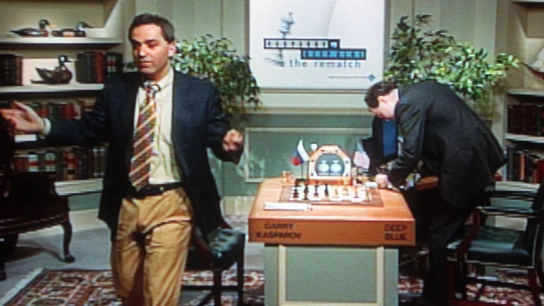Leave it to the Machines? Re-evaluating the Kasparov reply
6 March 2023
In 1997, Garry Kasparov became the first world chess champion to lose a match to a computer, IBM’s Deep Blue. Kasparov initially thought the IBM team cheated after the computer played what GM Yasser Seirawan described as a ‘human like move’ that ‘sent Garry into a tizzy’.
As Kasparov later described the match: “It was as intelligent as your alarm clock. Although losing to a $10 million alarm clock didn’t make me feel any better.”
Around 25+ years after the historic loss (which Newsweek then dramatized as “The Brain’s Last Stand”), Garry’s failure to defeat a computer at chess is hardly a notable embarrassment – this is now normal and expected. As of 2023, the world’s strongest player, Norway’s Magnus Carlsen, would have no practical chance at beating (and little chance of drawing) the top open-source chess computer program Stockfish available on his or your smartphone. (For some hypothesising about what would happen if Magnus played against the latest version of Stockfish (version 15) in a competitive match – see here – it’s not pretty).
For his part, Garry – who since retired (2005) and focuses largely on political commentary and activism – has now made a kind of ‘reflective peace’ with intelligent machines. In his book Deep Thinking: Where Artificial Intelligence Ends and Human Creativity Begins, Kasparov emphasises what he takes to be an important ‘upside’ of machines taking over the execution of increasingly many of our cognitive tasks. The upside concerns, specifically, what this then frees us up to do. As he puts it:
“Let’s look at this historical process. Machines that replace manual labor, they have allowed us to focus on developing our minds. More intelligent machines, I understand that they will take over more menial aspects of cognition and will elevate our lives towards curiosity, creativity, beauty, joy, you can continue this line.”
When I read Kasparov’s book in 2017, I admit I found the above line of thinking – call it the “Kasparov Reply” to the influx of intelligent machines – an attractive one. The idea seemed to be: computers are coming, but let them come for the menial tasks, which can free us up to do the kinds of distinctly human things computers can’t do, and which are of special human value. At least that’s how I interpreted it (convenient for me, you might think, as I assumed brazenly then that Philosophy was completely safe).
As readers will know, it is presently (in January 2023) far from clear just how safe Philosophy is – following OpenAI’s recently launched ChatGPT. This morning I asked it to critically evaluate intellectualism about know-how. Here’s the result:

I’d give the above something in the B-range? It gets a few things a bit wrong and leaves a few things out, but it’s really not bad (upper-level undergraduate level?) philosophising for a programme less than 3 months old.
Kasparov mentioned ‘beauty’ in his quote above (along with curiosity, creativity, joy), as an example of something humans can focus on when the machines are busy taking care of our menial tasks. Readers might be reminded of a story making the rounds in September 2022 where an AI-generated picture won an art-contest.)

I am not an art expert, but the above looks like it gets something in the “A” range.
At any rate, the above and other breakthroughs in recent AI (especially from OpenAI’s ChatGPT and DALL-E, which generated the picture above, along with Google DeepMind) should, I think, lead us to re-evaluate the flatfooted interpretation of the Kasparov reply I outlined above, and to consider how to better ‘future-proof’ it.
First, it’s worth making explicit that the category of things that are distinctively valuable for humans to do, and the category of things computers can’t do, might have previously largely overlapped (e.g., “let the machines do brute calculations and wash our clothes (i.e., the lowly stuff they’re capable of), while we reason about beauty”, etc.). But we should not assume these categories will continue to overlap. A ‘Kasparovian’ attitude towards intelligent machines should accordingly be refined to avoid a certain kind of complacency – whereby we imagine that such machines would be in a position to ‘replace’ largely only menial tasks, as opposed to tasks that are of special value to us.
Second, we should further resist the temptation to conflate an AI’s being able to do some activity type with the ‘redundancy’ of humans continuing to do that activity type.
Kasparov implicitly viewed the ‘menial’ to line up with those tasks intelligent machines can do, an identification which would lead one to think that if a task (presumed to be menial) can be done by a machine, there remains little point for a human to continue do it. But given that (as we’re now seeing) such an identification is increasingly mistaken, it’s likewise going to be mistaken to infer anything like the ‘redundancy’ of humans doing whatever can be outsourced to a computer.
Third, the more capable AI becomes, the more important it plausibly is that we not dedicate ourselves to whatever pursuits AI frees us up to do at the exclusion of also developing and cultivating delegative skills (cf. Carter 2023), skills that allow us to reliably delegate to AI in a manner that lines up with a good human life. The more achievements of human value AI continues to be able to at least closely mimic, the more challenging it becomes to determine just what to delegate and what not to delegate even if it could be delegated. This question – a version of which has already sparked some interest in recent virtue epistemology (e.g., Sosa 2021, Ch. 1; Carter 2023), is one I’ll be thinking about over the next few years as part of my AHRC Digital Knowledge project (2022-2025), along with project team members Jesper Kallestrup, Giada Fratantonio, Joshua Thorpe, and Edoardo Cavasin. For information on the project and to learn more about what we’re up to, see: https://www.digital-knowledge.org
Acknowledgement: Thanks to the AHRC Digital Knowledge (AH/W008424/1) project for supporting this work.
Comments
1 comment
Comments are closed.
- July 2024
- June 2024
- May 2024
- April 2024
- March 2024
- February 2024
- January 2024
- December 2023
- November 2023
- October 2023
- September 2023
- August 2023
- July 2023
- June 2023
- May 2023
- April 2023
- March 2023
- February 2023
- January 2023
- December 2022
- November 2022
- October 2022
- September 2022
- August 2022
- July 2022
- June 2022
- May 2022
- April 2022
- March 2022
- February 2022
- January 2022
- December 2021
- November 2021
- October 2021
- September 2021
- August 2021
- July 2021
- June 2021
- May 2021
- April 2021
- March 2021
- February 2021
- January 2021
- December 2020
- November 2020
- October 2020
- September 2020
- August 2020
- July 2020
- June 2020
- May 2020
- April 2020
- March 2020
- February 2020
- January 2020
- December 2019
- November 2019
- October 2019
- September 2019
- August 2019
- July 2019
- June 2019
- May 2019
- April 2019
- March 2019
- February 2019
- January 2019
- December 2018
- November 2018
- October 2018
- September 2018
- August 2018
- July 2018
- June 2018
- May 2018
- April 2018
- March 2018
- February 2018
- January 2018
- December 2017
- November 2017
- October 2017
- September 2017
- August 2017
- July 2017
- June 2017
- May 2017


I like debate, I love to watch they debate. and this re-evealuating bring new perspective for me.